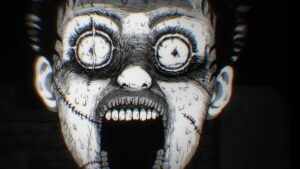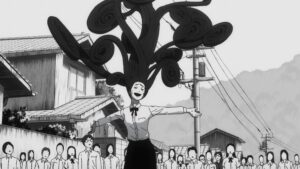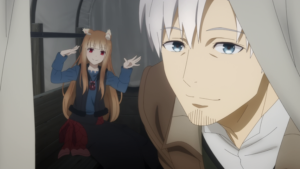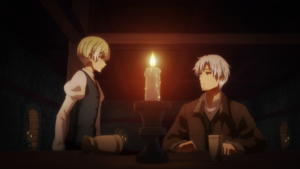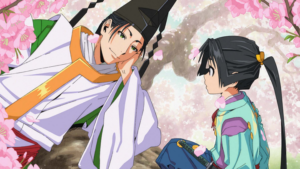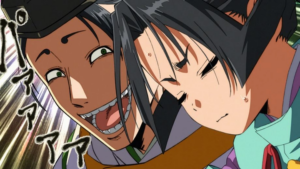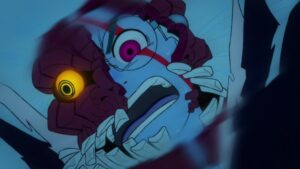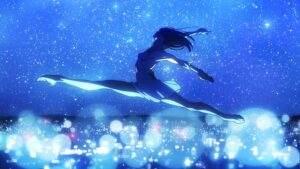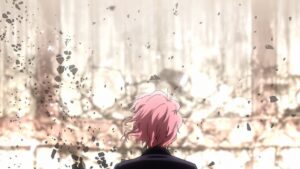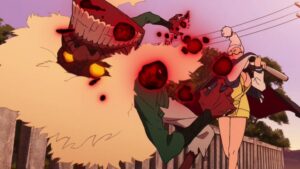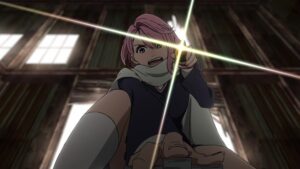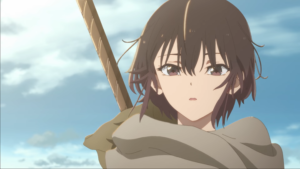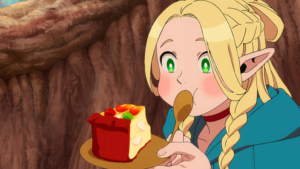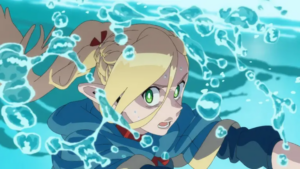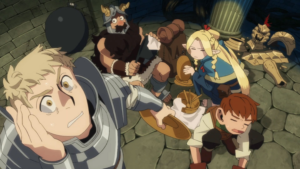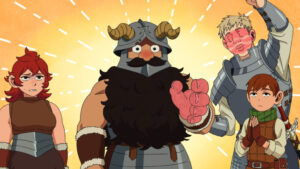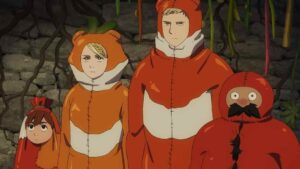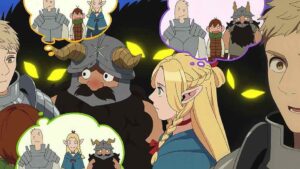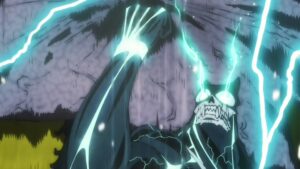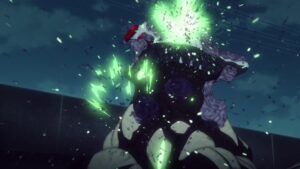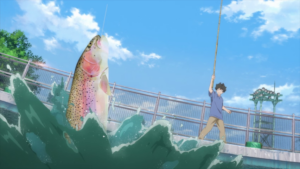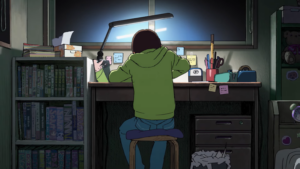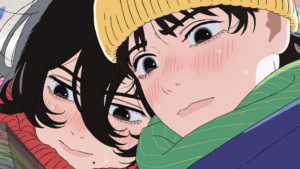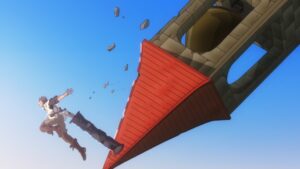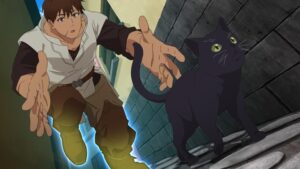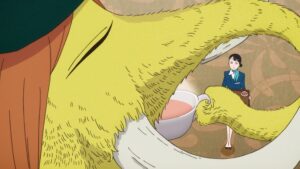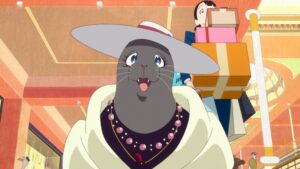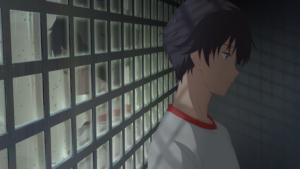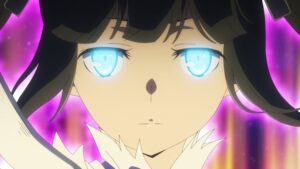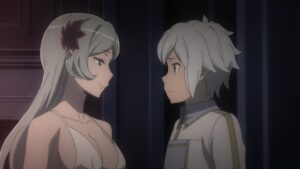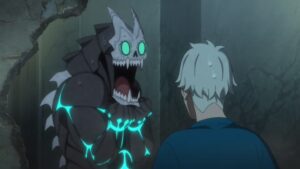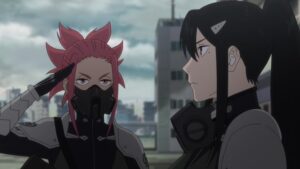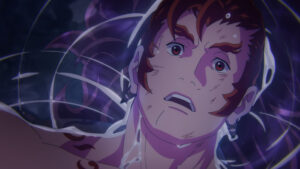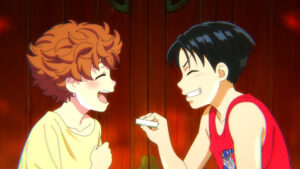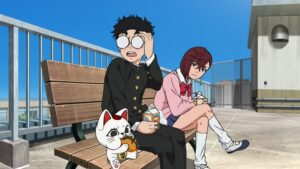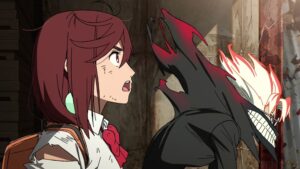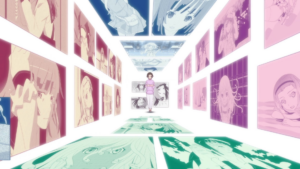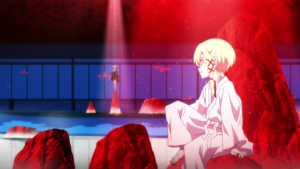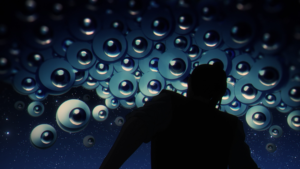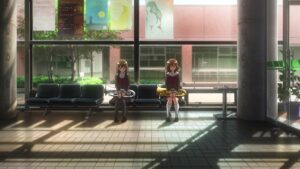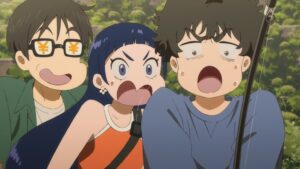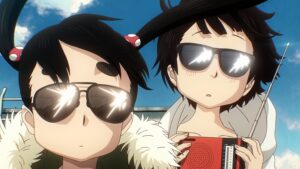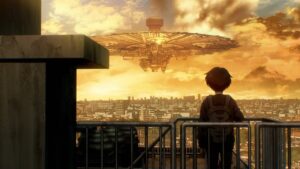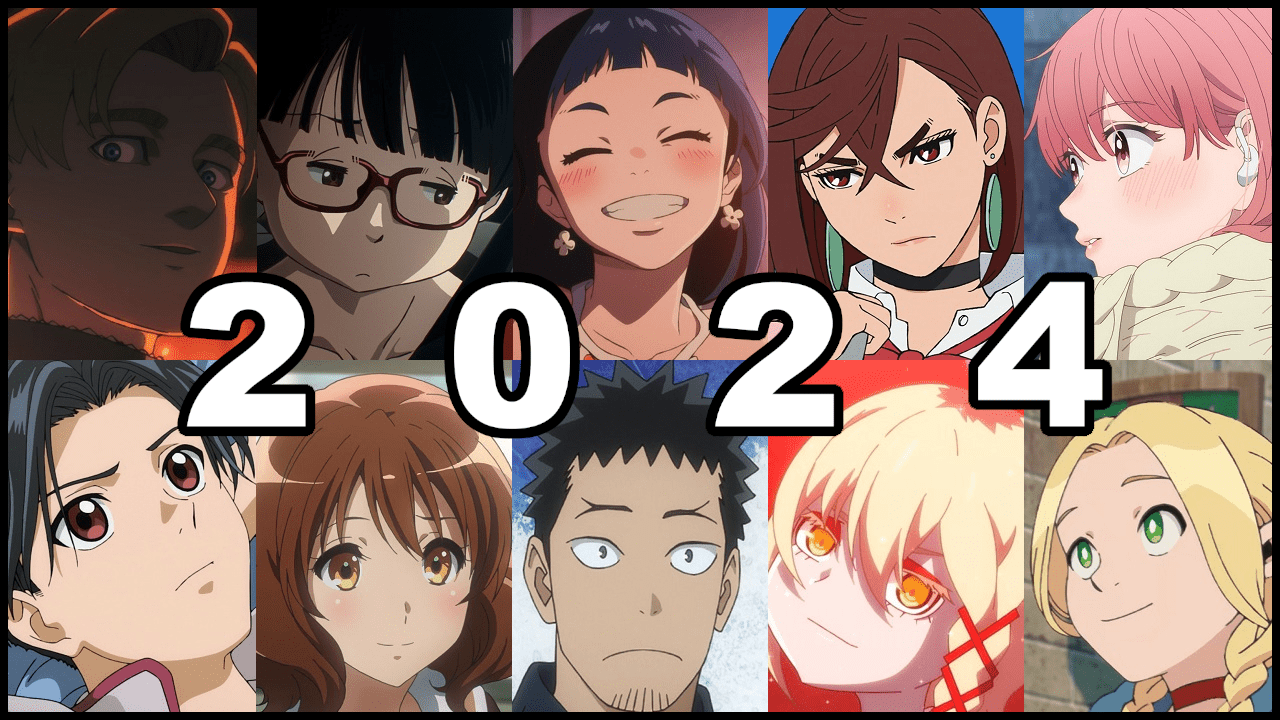
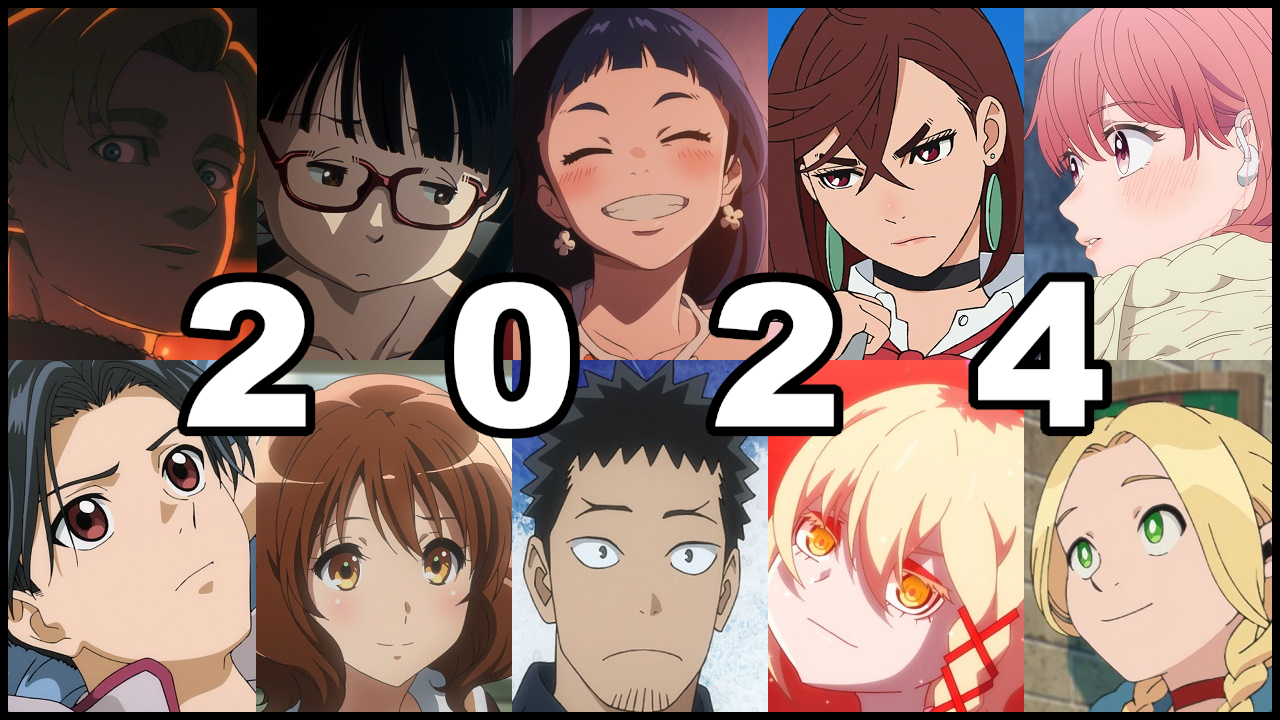
Lenlo: Hello all! It’s been a while huh? Can’t say this is unexpected, as life has a way of delaying things when you no longer hold yourself to a hard schedule. Still, this is way earlier than last year’s Anime of the Year, right? Small blessings. As far as 2024 is concerned, this was a pretty contentious year for us, with a lot of haggling for who thought what deserved to go where, at least outside of our #1 which had a pretty easy victory. That being said, click through to read about our favorite, and least favorite, series of the year as well as plenty of others – including some honorable mentions – and know that the site isn’t dead yet, just taking a bit of a break.
Worst Show: Uzumaki
Wooper: It feels a bit like punching down to choose such an obviously troubled production as the worst anime of the year, so let’s kick off this post not by focusing on Uzumaki’s most ramshackle visual moments, but on the narrative problems that plagued it from the very start. Even in the impressive-looking first episode, the show couldn’t boast a single character worth following, nor an effective arc to follow. It jumped into spiral-themed fixation within the first two minutes, and proceeded to circle that drain for twenty more, presenting itself as a slow descent into madness but really just positioning disturbing images and concepts one after another without considering how to most effectively connect them. Ostensible protagonist Shuichi functioned as little more than a spiral-detecting alarm bell, and his girlfriend Kirie, while granted more humanity, was simply an observer of supernatural horrors. She would go on to fight back against the curse in future episodes, but by then the series’ wheels had fallen off, and her courage was wasted on the rest of the charisma vacuums with whom she was forced to share the screen. Uzumaki’s animation may have suffered a legendary falloff, but perhaps the real tragedy here was that its source material was never properly tweaked for TV to begin with.
Runner-up: METALLIC ROUGE, for taking one of the most interesting sci-fi premises of the year and turning it into an absolute mess of unrelated and played out sci-fi concepts.
Biggest Disappointment:
Spice and Wolf (2024)
Mario: I love the original Spice & Wolf. It may suffer from production issues, but the love quarrel between Holo and Lawrence makes it one of my favorite shows of its year. This 2024 version though, despite its updated production, does very little to improve on the original. Comprising three arcs already present in the 2008 series (why?), there’s just something missing in the tone of this new adaptation. Dramatic moments fail to make an impact, and the execution is more clumsy from one scene to another. Meanwhile, the visual presentation lacks the charm and warmth of the original, despite its new coat of paint. The backgrounds, while detailed, can feel sterile, and the animation occasionally dips in a way that undermines the emotional weight of the key scenes. This 2024 version can still serve as a good introduction for new fans of this universe, but for those of us who waited years for a continuation, the series feels like a shadow of its former self.
Runner-up: KAIJU NO. 8, for squandering its excellent premiere by devolving into power level-fueled Attack on Titan mimicry.
Worst Character: Yorishige Suwa
(The Elusive Samurai)
Lenlo: It takes a lot of work to create a character as negatively impactful towards a series as Yorishige Suwa. Billed as a dramatized historical epic about a young child retaking his lands and fighting back against a tyrannical warlord, Elusive Samurai was set up for success with its likeable, layered lead and his compelling quest for revenge, and Yorishige was positioned as his knowledgeable mentor. At every turn however, he did his level best to ruin that. From acting like a childish idiot and refusing to actually do much of anything, to being constantly used for concerning and awkwardly sexual jokes about children, Yorishige tore us away from every dramatic scene, every compelling plot, and every moment of peace between conflicts. In every way imaginable, he brought Elusive Samurai down, and it’s for that reason that he is our Worst Character of 2024.
Runner-up: YUKIO OKUMURA (Blue Exorcist), for throwing away his brother’s kindness and care, being a stuck up pretty-boy, and is generally just the bane of this show’s existence.
Best First Episode: Dandadan
Amun: If hearing me babble on about how much I liked Dandadan – crass humour issues aside – isn’t for you, then you might want to skip most of this post. I think I have at least 3 blurbs about this show in our 2024 Anime of the Year. Let’s start at the beginning, when we first met our silly teenagers and why this episode won out. A premiere is a chance to really hook an audience – get them to buy into the core premise of the show. Momo, a pretty girl with a very particular taste in guys (which isn’t going well for her), meets a supernatural nerd. They both have rather competitive personalities concerning aliens and the occult, so they dare each other to try and prove the other one wrong by going to hotspots. Then it goes sideways. Seems a simple enough premise – so why the high praise? Basically, it’s the relationship of the two – there are plenty of shows that do nerd + pretty girl, but I haven’t seen as many where the two leads have such great chemistry. The snappy conversations, the extremely believable petty conflicts, and the fast paced humor really nails how these two are actually great as a pair, social differences notwithstanding. Finally, what secures the win for me is tying the episode all together with Okarun’s real name – fantastically tying up the episode to provide a complete first story while still previewing the great journey to come. And, as we discuss later in the post, this season turned out to be a visually stunning outing with great character relationships, proving that the first episode delivered on its promise.
Runner-up: A SIGN OF AFFECTION, for creating an engrossing interior world for its main character through muted sound design and attractive lighting.
Best Single Episode: Dandadan #7
Wooper: The four of us were split on Dandadan this year; two writers were fans and two were decidedly not. Despite falling into the latter camp, though, I greatly admired its seventh offering, which spent half of its runtime documenting the tragic former life of a malevolent spirit named Acrobatic Silky. This was a real departure for the show, as it shed its typical irreverence and, with almost no dialogue, told the story of a single mother struggling to make ends meet. Through stark depictions of self-managed prostitution and a violent encounter with a loan shark, “To a Kinder World” constructed the sort of cruel reality that might truly give birth to a fearsome youkai. That the relationship between the nameless mother and her cheerful daughter was so sweet only made her death more bitter, but the episode still found beauty in its conclusion, with a spellbinding ballet sequence atop a moonlit lake in the mind of the dying woman, and a plea from one of Silky’s present day victims that she and her daughter be reborn under a more benevolent star. If I return to Dandadan for its second season, it will be only with the hope that another work of art like this one will be waiting for me.
Runner-up: ORB: ON THE MOVEMENTS OF THE EARTH #3, for turning a romanticized historical drama on its head and into something unexpected and special.
Best OP: “Otonoke” (Dandadan)
Mario: It’s been a great year for Creepy Nuts in this department, as both the Mashle OP and this one took the anime fandom by storm. In “Onotoke”, both the art and music immediately pop into your head, grab your attention and hold it till the very end. The visuals move fluidly between the silhouettes of supernatural beings and the human characters’ facial expressions and dance moves, opting for a funky look in one scene that might become realistic or dynamic in the next. Musically, the fast-paced hip-hop beat, accented with jazzy guitars and chipmunked vocal samples, has a chaotic energy that perfectly reflects Dandadan’s eccentric and bombastic narrative. All in all, “Onotoke” captures the beating heart (and maybe the golden balls) of Dandadan and embodies all the elements that make the show special.
Runner-up: “ASSU” (One Piece), for bringing us what is, in my opinion, the most colorful and delightfully animated OP of the year, chock full of meaning and interesting visual direction. All hail Ishitani.
Best ED: “Crazy For You”
(Too Many Losing Heroines)
Lenlo: Having not watched Heroine (it wasn’t my kind of show), I was absolutely blindsided by this ED. From stunning detail and linework to vibrant, contrasting colors that make every scene stand out, it’s absolutely beautiful. It’s crazy how they took such dark colors and made them appear bright, how well the translucent film shifts and rips as she moves, or how they handle water at the end. Despite having plenty of common visual motifs we see so often in EDs, running and night skies, etc, “Crazy for You” is one of the most visually standout endings of the year, and that was what pushed it to the top of our list.
Runner-up: “LOVE 2000” (Too Many Losing Heroines), for its mixed media execution that seamlessly fuses live-action photography with stop-motion and hand-drawn animation to bring its colorful romance to life.
Best Animation: Dandadan
Amun: Post number 2 of the Dandadan appreciation! This time is an homage to the outstanding animation, fluidity of scenes, and general attention to detail that goes above and beyond what’s required for what is essentially a supernatural-buddy-cop-that’s-actually-highschool-students. The fight scenes and set pieces are top quality – and surprisingly prevalent in a show that could coast by with slice of life filler, no problem. What really kicks it over the top for me is the ray-tracing and reflections in the curved surfaces (particularly of the ever important shiny gold balls…). That’s just a level of detail that your mind can’t process as fast as the scene occurs – but leaves you thinking, wow. Dandadan can clearly hold its own with other visual-first shows (such as JJK), and that’s the reason it takes our Best Animation Award for 2024.
Runner-up: DUNGEON MESHI, for bolstering both its comedic and action-heavy scenes with the same precise, pose-heavy approach.
Best Background Art:
NegaPosi Angler
Mario: If you look closely at our ballots (linked several sections down), this category is one where we couldn’t be more different, as we picked eight different shows for Best Background Art. The lack of a clear consensus speaks for this year’s art direction in general: there were many solid choices, but none of them were truly elite. After some discussion, we ended up with this winner: NegaPosi Angler. The background art in this series stands out for its urban authenticity, comfortable color palette, and the way it arranges its architecture to reflect the emotional tones of the story. Each scene feels vivid, with the environment not only providing an attractive visual backdrop, but also complementing the narrative by mirroring (sometimes literally) the characters’ inner thoughts. This attention to atmosphere elevates the show’s storytelling, turning the backgrounds into an integral part of NegaPosi’s charm.
Runner-up: SHOUSHIMIN SERIES, for bringing its detailed and colorful city to life.
Best Soundtrack: NegaPosi Angler
Wooper: The trouble with a fall series winning Best Soundtrack is that its OST won’t be released for months, but that didn’t stop us from recognizing the strength of NegaPosi Angler’s guitar-driven score during its initial run. Actually, “strength” might not be the right word, since most of its tracks feature either classical or acoustic guitar without any accompaniment, resulting in a quite low key vibe – perfect for a show about fishing. Even without a broad instrumental palette, NegaPosi’s soundtrack gives you a lot of bang for your buck, since each of its dozens of miniature compositions are tailor-made for their respective scenes. Fish not biting? Throw out a few fingerpicked chords before easing into silence for a while. Got a big one on the hook? Introduce a piano or tambourine to go with some fast steel string arpeggios. Loan sharks chasing you across town, as in the series’ third episode? No problem – the guitarists’ tempo will perfectly match the characters’ running speed and energy levels. The musical approach here was precisely the opposite of most anime, which record a dozen overproduced tracks and reuse them across multiple episodes. Instead, NegaPosi kept it simple, yet never played the same tune twice, resulting in the most observant, best-fitting soundtrack of the year.
Runner-up: HIBIKE EUPHONIUM S3, for skillfully blending emotionally resonant original compositions and iconic classical pieces, authentically capturing the passion, as well as the struggles, of the ensemble cast.
Best Voice Actor: Fairouz Ai
Amun: (When looking up the roles for Fairouz Ai, I saw on Instagram about her decision to step back recently due to PTSD, so our absolute best prayers and wishes for her on-going recovery). It’s funny, but I didn’t actually put Fairouz Ai forward – the role she was nominated for was Hana Ayukawa from NegaPosi Angler, which I didn’t end up watching. However, when looking over her credits, I saw a number of great roles, supporting and lead, which made me cast my vote for her during the run-offs. Let’s talk about her lead roles first, mainly Yumiella Dolkness in “Villainess Level 99” and Belle Lablac in “Bye Bye, Earth”. Both of those roles were pretty subdued, with Yumiella being more aloof and thicker skinned, while Belle was an outcast, trying to find her way. How’d she do? I really enjoyed her voice work in “Villainess Level 99” and I think nothing Fairouz Ai could have done would have saved “Bye Bye, Earth” – her characterization was a bright spot in an otherwise mess of a season.
Given those two “quieter” characters, you would think that her supporting roles would look pretty similar right? 100% opposite. Grim in “Reincarnated 7th Prince” is a scheming (and screaming) demon, Shinomiya in “Kaiju No. 8” as the tsundere fighting prodigy, Liz Smart in “Let This Grieving Soul Retire” as the psychopathic puncher….and a slightly calmer, but still high-energy Nao in “365 Days to the Wedding”. All of those roles brought instant, over-the-top energy that slapped you in the face every word. If there’s a show I enjoyed this season, she has a better than not chance of being the main supporting character! Finally, she’s half-Japanese (like me!), making a living in a notoriously difficult industry (not like me) – and doing a bang-up job of it. How can I not cheer for her? Given that complete body of work in just this year – mind you, I haven’t even seen the role she’s nominated for – our best VA award goes well-deserved to Fairouz Ai.
Runner-up: SAYAKA SENBONGI, for doing great work as Shuna in “Slime”, Clay in “Dungeon People”, and – of course – Marcille in “Dungeon Meshi”.
Best Character: Marcille Donato
(Dungeon Meshi)
Lenlo: When writing a character, striking that balance between comedy and dignity can be exceedingly difficult. Go too far and they end up either as an overdone joke or a monotonous pit. That challenge is part of what makes Marcille stand out as much as she does, she’s able to shift seamlessly between the collective stupidity of the group and dramatic narrative that is the backbone of the series. More than just the straight man to Laios and Co’s antics, she is, in my opinion, the soul of the group that ties them all together. Combine that with Sayaka Senbongi’s phenomenal VA performance and you have a winning combination for the year.
Runner-up: FIGHTER D (Go Go Loser Ranger), for their unwavering determination, comedic bravado, and the unexpected depth behind their seemingly simplistic antihero persona.
Best Cast: Dungeon Meshi
Wooper: Can you imagine how different Dungeon Meshi would have been if, rather than its crew of lovable misfits, we’d watched a strait-laced group of explorers traverse its dungeon floors? Or if, God forbid, its primary cast had consisted of a stoic male lead and his band of haremettes? Without Laios’s obsessiveness, Marcille’s anxiety, Chilchuck’s world-weariness, and Senshi’s inflexibility, this series would have cooked up a recipe for failure. All four characters possessed admirable traits as well, but the joy of watching this series came in seeing how they’d butt heads in each of its bizarre situations, and only after that, how those better qualities would emerge to strengthen their adventuresome bond. Dungeon Meshi did more than just design the perfect party, too – prior members and new additions such as Shuro (plus his kickass band of female warriors) and Izutsumi helped round out an expansive cast, with the latter in particular becoming a fan favorite upon her enrollment with Laios’s squad. Given the incredible risk involved in descending the show’s namesake dungeon, it was only fitting that its dungeoneers would have a few screws loose, but that craziness made their quarrels and collaborations some of the best character moments of 2024.
Runner-up: DEAD DEAD DEMON’S DEDEDEDE DESTRUCTION, for its cast’s richly developed personalities, nuanced relationships, and how their mundane struggles contrast with the backdrop of an extraordinary, apocalyptic setting.
Best Comedy: Dungeon Meshi
Mario: Dungeon Meshi shines as the best comedy series of 2024 due to its masterful blend of humor, creativity and heartfelt storytelling. The series puts a new spin on the fantasy genre by turning dungeon crawling into a culinary adventure, creating clever gross-out gags as the characters attempt to eat monsters using real life cooking techniques. Its humor is elevated by the endearing and undeniably quirky cast, whose distinct personalities and (mostly) good-natured antagonism create constant comedic gold. Still, the show never shies away from more emotionally deep flashbacks and character writing, turning many of its episodes into multidimensional experiences. With its fresh premise, energetic animation, and laugh-out-loud moments, Dungeon Meshi set a new standard for fantasy comedies this year.
Runner-up: KONOSUBA S3, for continuing the franchise excellence of immature hijinks that strangely draw you in and keep you there for the season.
Best Action: Kaiju No. 8
Amun: Brilliant, I get to write about something other than Dandadan! And what better of a show than Kaiju No. 8, which features some old-school monster fun with some new-school twists! Kaiju No. 8 is a show that definitely has an unbalanced allocation of resources. The character designs are very simple, good enough to get the job done. The colours are generally military drab, with a few flashes of contrast. The action though – that’s where the effort is spent. What stands out to me is that the action sequences and the fights are not just an overabundance of key-frames and high delta work. Instead, there are clever cuts and switched up sequences that keep the fights feeling fresh and uptempo. Recently anime have been doing a better job of integrating CGI, and I think Kaiju No. 8’s usage with the backgrounds and dynamic camera movements is the right answer. The conventional animation is still spent where it’s needed, slicing up monsters in terrific detail. Finally, Kaiju No. 8 just has a lot of set piece scenes and fights – the action is pretty well non-stop. For that, and the high quality maintained throughout the season, Kaiju No. 8 gets our best action nod for 2024.
Runner-up: THE ELUSIVE SAMURAI, for reframing victory in combat as something that can be achieved through flawless positioning and elegant evasion.
Best Drama: Hibike Euphonium S3
Wooper: One of the climactic moments of Hibike Euphonium’s first season saw a Kitauji High newcomer audition against the concert band’s president for a coveted solo spot, with the newcomer emerging victorious. Flash forward two in-universe years (nine in our world), and season 3’s penultimate episode featured nearly the same setup, with protagonist Kumiko now occupying the role of the defeated band president. In another show that might be grounds for criticism, but Euphonium was always a full-circle sort of anime, and this year it closed Kumiko’s arc in powerful fashion, providing numerous opportunities for her to prioritize her leadership role over her wishes as an individual performer. Emotional underclassmen, an inscrutable transfer student, a disloyal best friend, and insecurity about her future put plenty of issues on her plate, but she addressed each one with slowly budding confidence, adding legitimacy to her conclusive career decision. In the end, despite deviating from its source material, Hibike Euphonium did right by its protagonist and, through her, its concert band as a whole, cementing itself as one of the best music-themed anime of the last two decades.
Runner-up: DAYS WITH MY STEPSISTER, for vastly outperforming the expectations that came with its name and providing an excellent snapshot into the confusing reality of being a teenager.
Best Original Show: NegaPosi Angler
Mario: This year we had a handful of original shows vying for the top spot, and many of them brought unique premises to the table, but the winner was perhaps the most low key of them all. NegaPosi Angler, as the title suggests, uses the concept of “positive and negative energy fishing” as both a narrative device and a metaphor, where the characters cast lines into the sea of their emotions to confront their inner struggles and connect with others. It frames fishing as a way of healing not only in the short term, but in the long term as well. The characters are thoughtfully developed, each bringing their colorful personalities to their shared convenience store job, where their jokes, confessions, and bonding sessions earn them the title of “makeshift family.” While it’s not the first of the half dozen fishing anime we’ve had over the years (including some great ones such as Tsuritama), NegaPosi Angler still manages to be a fresh and strangely poignant show.
Runner-up: TRAIN TO THE END OF THE WORLD, for its bonkers premise (where 7G destroys the world) and its no-holds-barred commitment to just being weird and trippy.
Best Movie: Look Back
Lenlo: My relationship with Tatsuki Fujimoto’s works can best be described as… strained. I’m not a fan of Chainsaw Man, and I absolutely hated Fire Punch. But it’s because of that relationship that you can know that what I’m about to say, I say with no bias nor influence from his other works: Look Back may be one of the most emotionally affecting movies/manga I have ever had the pleasure to read/watch. The way he communicates the creative struggle, of comparing yourself to others and using that to grow, of the people you meet and friends you make and how deeply personal and affecting it all is… There’s no other word for it than beautiful. Combine that sort of narrative with the incredible work of Kiyotaka Oshiyama and his team at Studio Durian, and you have what is, in my opinion, the best anime movie in almost a decade.
Runner-up: THE BOY AND THE HERON, for (potentially) capping off Hayao Miyazaki’s career with a plethora of gorgeous fantasy sequences and imaginative worldbuilding decisions.
Lenlo: I Parry Everything
It’s funny how despite writing an entire review about this show, despite knowing there’s nothing particularly special about it in any way, despite ripping into OP MC shows every single Season Preview… I keep coming back to I Parry Everything. Not because of the animation, it looks decidedly average, nor for the complex world building and engaging plot, both of those are rather rote. No, it’s because the show is good, simple, earnest fun. There’s no edgy bullshit, the MC isn’t some toxic asshole acting like he’s god’s gift to women, it’s not even an isekai! Instead, I Parry Everything is about a genuinely good guy who only wants to help people, not caring at all for any rewards or recognition, willing to do even the most menial of chores if it means it will help someone out. That shouldn’t be as rare as it is, but the fact remains, I Parry Everything stands out amongst the OP MC genre of shows.
Wooper: The Concierge at Hokkyoku Department Store
Between the debut of the buzzed-about Look Back, the home release of The Boy and the Heron, and the continuations of series like Haikyuu and Mononoke, there sat a little film that received subtitles just in time for consideration this year. That film is The Concierge, a 70 minute whirlwind of luxury shopping, occupational anxiety, and expert animal animation. With a cast of characters including seals, lions, peacocks, and even a woolly mammoth, great care had to be taken when drawing each species’ style of movement, and this movie managed that task with aplomb. Not only that, but the setting of the department store itself was wonderfully realized: multiple floors packed with shops and restaurants, brought to life with textures that suggested marble floors and abundant light sources without relying too much on brightness. At the heart of the story is clumsy new hire Akino, whose dedication to Hokkyoku’s extinct or endangered clientele provides a worthy narrative core, but it was Woolly the ice sculptor (voiced by an unusually sedate Kenjirou Tsuda) who became my favorite by the time the credits rolled. You can’t go wrong with any of the characters, though, nor the plot’s touching resolution – my only issue with the film is that it wasn’t longer!
Mario: Days with My Stepsister
I finished Days with My Stepsister a day after submitting my ballot, so it missed out my original top 10, but it is a show that I wholeheartedly recommend despite (or perhaps because of) its tricky premise. In the same vein as shows like Koi Kaze and After the Rain (both which I love), the series follows two strangers brought together by circumstance, who must navigate the awkwardness and challenges of their blended family. What sets this story apart is the nuanced portrayal of their developing relationship, emphasizing natural dialogue (the most natural we’ve heard in ages in this medium), quiet moments, subtle gestures, and simmering but authentic character growth. Indeed, the show doesn’t rely on dramatic twists or over-the-top conflict, but thrives on the everyday interaction between the two leads. The framing – which reminds me more of live-action than animation – often uses lingering and long shots to emphasize the emotional weight of even the simplest moments, drawing viewers even further to the characters’ psyches. The soundtrack is another highlight, featuring soothing piano melodies that perfectly underscore the series’ emotional beats. While some might find the pacing slow or the lack of dramatic moments underwhelming, Days with My Stepsister excels as a quiet, character-driven story about family and connection. It’s a show that rewards patience, offering a touching and heartfelt experience that lingers long after the credits roll.
PS: I suspect that the show is struggling to find the right audience. Those who come expecting controversy may end up bored, whereas those looking for a meaningful story will be turned off by its premise. A bit of a shame, really, since it deserves a lot more attention.
Amun: DanMachi Season 5
I’ve been very ill lately (apologies for probably a shade lower quality of writing), but no sickness can keep me from extolling my pet anime – DanMachi! And what a season it’s been! I am a massive fan of the despair and desperation from the lower floor adventures from last season, but season 5 has opened up a new story to explore: being the only sane person in a world that’s gone mad. Without spoiling too much, I am a huge fan of how this storyline’s been handled. Towards the back half (really the last two episodes), I’m not as thrilled about the massive battle of the Familias, but the several episodes prior (and especially Hestia going beast mode) are well worth a little lag in the middle. I think DanMachi is really improving season over season (with the exception of season 2), so I’m very excited to see it continue.
Here’s a link to our individual ballots, so you can see how we settled on these ten shows in this particular order. Let’s go!
9 (Tie). Kaiju No. 8
Amun: I’m back again, on Kaiju No. 8. Previously you heard me praise the action and animation of the fights – here, I’ll talk about all the other things I loved. Particular highlights were the characters (also, great soundtrack, and a great OP/ED). Kaiju No. 8 keeps it simple, in character designs, in backstories, in overall plot. Our hero had a great underdog story that got turned on its head with an unexpected super-power. The magic isn’t in the simple premise – Kaiju No. 8 just executed well on every level. The world is very relatable, but not so overly complex that you lose track of what’s important: killing monsters and catching up to childhood friends. Like its lead, Kaiju No. 8 is simple, straightforward, and is a darn good show because of it. I look forward to the future seasons, and I really hope they don’t get tangled up or lost along the way.
9 (Tie). Bucchigiri
Lenlo: One of the last reviews I wrote for this site before my retirement, there’s a special place in my heart for Bucchigiri. Full of bright colors, bombastic characters, over the top fights and a heartfelt story, it’s exactly what I want from an action show. Is it perfect? No, the humor can be a bit juvenile and the delinquent school setting is a bit overused. But similar to I Parry Everything, earnestness can go a long way. For all of its faults, Bucchigiri never compromised on its vision, never walked itself back or tried to be something it wasn’t. The bad jokes came hand in hand with the over the top fights and story, they weren’t kept separate and distinct, and the character moments got just as much attention and animation as the fights. All in all, it was one of the most fun shows I watched this year, even if it may not have the same lasting impact as others on this list.
8. Dandadan
Amun: Dandadan’s here at number 8 (although I suppose Kaiju No. 8 would be better suited from a numerical matching perspective). Flashy fights, unexpected twists, and a decent amount of fanservice will take you so far, but what makes Dandadan a future powerhouse is the core relationship between the leads Momo and Okkarun. We’ve seen tons of pairings of popular girl (or boy) and nerd, but Dandadan has some genuine organic chemistry between the leads. The non-supernatural situations they have to deal with – like jealousy, mistrust, confusion about where they stand – are all very realistic approximations of high school life. What makes the story fun is the addition of the supernatural hijinks (and some admittedly unnecessary fanservice along the way). The character designs are fun, the world is colourful and big, the enemies are unique, silly, and sometimes sinister – this is just a great recipe for an anime. Obviously the crude humor is overdone – it pains me that they’ve made it integral to the story. That caveat aside, I’m looking forward to this becoming a solid franchise for years to come.
7. Monogatari Series:
Off & Monster Season
Mario: It’s been 15 years (and counting) since its first anime adaptation, but it looks like the Monogatari Series is here to stay, huh? As the franchise is among my absolute favorites, I’m happy for its inclusion here. Off & Monster Season had a new director at the helm in Midori Yoshizawa, but if anything it looks and feels more refreshing because of it. Visually, this season continues to dazzle with unique art direction, plus Shaft’s iconic typography, abstract imagery, and head-tilts (a highlight here is Nadeko fighting against her various selves). Story-wise, as a new chapter in the saga, Off & Monster Season serves as a continuation for many of the cast’s stories as they take on their own issues, and provides much-needed backstories for others. Newly introduced characters such as Deathtopia Virtuoso Suicide-Master fit with the rest of the cast like a glove, as well. For those willing to dive into its layered storytelling and philosophical musings, this new season is another must-see, and serves as a solid continuation of one of anime’s most iconic franchises.
6. Orb: On the Movements
of the Earth
Lenlo: If you had told me at the start of the year that a historical drama about heliocentrism would be one of the most compelling anime I’d watch, I’d have called you crazy. Not only is it a subject anime rarely touches, like most things that aren’t fantasy/isekai, it’s also such an odd idea I’d never expect it to actually work. And yet, here we are. A story where the main character in a concept, where leads slowly replace each other as heliocentrism progresses through the ages, where the main conflict is about spreading the truth instead of defeating the demon lord. It isn’t perfect, Orb is barely animated at times and has a weird obsession with poorly lit shots, but god damn is the cast and narrative compelling. Seeing how each one relates and understands heliocentrism differently, how they interact with the world and the research, as well as how those relationships and understandings get passed on to those who come after. It’s one of my favorite shows of the year, and I’m incredibly excited to see where it goes.
5. A Sign of Affection
Lenlo: Romance anime, for the longest time, has felt bland to me. So often it’s the same thing over and over and over again, highschoolers with pointless drama that could be easily fixed simply by talking to each other. So getting something that was a bit older, with characters that were a bit more sure of themselves and what they wanted out of a relationship, even if university still counts as school, was nice. Not only that though, Yubisaki also avoids the pointless communication-based drama entirely, instead making communication the point of the entire show. With one lead deaf and the other forever seeking to engage with new cultures and people, how Yuki and Itsuomi get into a relationship and show affection to each other becomes the central pillar of the entire series, resulting in a romance that actually cares about the romance and not the drama. To make a long story short, Yubisaki is an incredibly cute and wholesome show about an unlikely couple overcoming a sensory barrier with loads of slow-burning affectionate romance throughout it all, and I loved it.
4. Hibike Euphonium S3
Mario: Sound Euphonium 3 serves as a perfect conclusion to the beloved 10 year long series. Picking up where the Ensemble Contest Arc Movie left off, this final season continues to explore the growth and conflicts of the band members, especially Kumiko now that she’s the band captain. One of the standout elements of Sound Euphonium is its ability to simultaneously capture the complexity of both its characters and the music they make. The attention to details in the musical arrangements, combined with the precision of the animation, make the band’s rehearsals and performances feel truly special. In addition, Kumiko’s journey of self-discovery and her continuing friendship with Reina adds a rich layer of emotional depth. With an ensemble cast this large, it’s to the show’s credit that we feel like we know every one of them and the bonds they’ve built over the years. Overall, Sound Euphonium 3 delivers another beautifully composed and emotionally resonant chapter to its story. It’s a return to form for the great Kyoto Animation after that tragic arson attack, ensuring that the franchise will resonate long after the final notes fade. Thank you KyoAni!
3. NegaPosi Angler
Wooper: When the four of us got together and revealed our Anime of the Year ballots, I was surprised to find that NegaPosi Angler was one of only two shows to receive a vote from at least three writers – after all, it operates on the sort of quiet wavelength that many fans won’t match. Still, its good qualities are evident to anyone willing to sit down with it for a few episodes: understated comedy, an ear-catching soundtrack, consistent production from studios NUT (animation) and Chiptune (backgrounds). What I want to single out for praise, though, is the show’s dialogue. As an original work without a pressing plotline, NegaPosi’s characters were free to talk to their hearts’ content, and that conversation took on many forms: encouragement for first-time fisher Hiro, banter from expert angler Hana, unexpected wisdom from cosplay model Ice, and velvet-voiced narration from the mysterious Fujishiro. When a typhoon trapped nearly the entire cast in the break room at work, the show rose to the challenge, delivering one of the most fun scripts of the year; when it came time for Hiro and his roommate Takaaki to reconcile after a bitter feud, their circuitous apologies unfolded at a perfect pace. This was a show that kept my attention because I wanted to see not what the cast would do, but what they would say. May we receive more anime like it in the years to come.
2. Dead Dead Demon’s
Dededede Destruction
Wooper: A Japan-only theatrical release. A jarring prologue that took place near the end of the story’s chronology. Mistimed English dubtitles used for the ONA version’s initial rollout. The obstacles facing this show’s journey to the west were many, but its narrative ambition and sheer strangeness made it worth the effort. During its 18 episode run this year, Dead Dead Demon tackled huge topics such as government-fueled misinformation, the dangers of AI’s military applications, and how not to succumb to despair in the face of an unavoidable apocalypse. By bringing aliens to Tokyo and forcing us to watch as humanity slaughtered them, it held up an ugly mirror to our intolerance of those we deem unlike ourselves. By hopping between timelines, it asked whether the pursuit of a more desirable future was worth the unforeseeable consequences of the jump. And it looked damn good amidst all this ideological interrogation, playing host to some of the year’s most striking character designs and individual shots (the image of Ooba’s half-swiveled head is already an all-timer in my mind). It was the only anime on this list that got me off my ass and back to (highly sporadic) blogging – but it wasn’t the best of the year.
1. Dungeon Meshi
Amun: The only series post that I’m writing that doesn’t involve Kaiju No. 8 or Dandadan is the finale – it’s my honor to award the prestigious, coveted Star Crossed Anime of the Year to Dungeon Meshi! And what a show – Dungeon Meshi does it all, with style (must be that juicy Netflix money). We have a great cast of characters, some EXCELLENT plot twists which I won’t spoil if you’ve somehow denied yourself the pleasure of watching it yet, a beautiful looking world and scenery. I love the general journey feeling of the show – but it’s not a normal journey that advances in a straight line with joys and sorrows. No, Dungeon Meshi sometimes feels like the grand adventure is being driven by a happy drunkard, crashing into all manner of things along the way, while having a grand time. Then, inexplicably, it turns into a cooking show – only the ingredients are nothing of this world, and the cooking tips will be in no way helpful to anyone in the real world. That sounds incredibly tedious on paper, but for some reason – I’m completely hooked. That’s not to say the more serious themes aren’t being addressed, and I’m looking forward to season 2 learning more about the mysteries of the dungeon. I can’t wait to get back in there with the crew, going on adventures and eating some more monsters!

